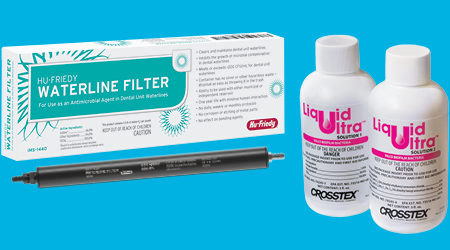
Best in Practice Learning Hub - Water Management

Best in Practice Learning Hub
Poor water quality can harm patients, staff, and equipment— not to mention the reputation of your practice. Our comprehensive line of dental water products can help to improve patient care, staff productivity and practice profitability, while helping to maintain compliance1 with regulatory guidelines.
Operatory
The long and narrow design of DUWLs creates the perfect breeding ground for microbial growth. When untreated, or improperly maintained, the water flowing through these contaminated DUWLs and out through dynamic instruments used during treatment can potentially harm your patients, staff and practice reputation.
In recent years, headlines have brought attention to contaminated dental treatment water that resulted in the hospitalization and treatment for Mycobacteria (NTM) infections following pulpotomies in over 90 pediatric patients. However, the negative effects on overall health from contaminated treatment water is not limited to pediatric patients. Practitioners may not become aware of patient illness in the weeks following treatment as patients may not associate post-treatment illness with their dental visit. Just as important is the potential impact to clinicians from constant exposure to contaminated aerosol.

Steri Center
Even treated city water isn’t pure enough for sterilizing dental instruments, because of the presence of dissolved mineral content and other contaminants in the water. This is why many dental offices spend time and money purchasing and storing jugs of purified water to fill their autoclaves and bottle systems. That gets expensive, time-consuming, and really inconvenient.
Some municipal water quality can be so poor that it can damage dental instruments inside instrument washers. The interaction of water contaminants, oxygen and high heat can create an environment susceptible to oxidation, which can cause discoloration, spotting and even corrosion of dental instruments over time

Mechanical Room
While not often at the forefront of practitioners’ minds, the mechanical room is the backbone of the practice and vital to providing high-quality patient care. As such, investing in high-quality equipment is crucial to the success of the practice.
Many practices prefer the convenience of connecting their dental delivery systems directly to a municipal water source. While direct connections can be more efficient than filling dental bottles, this approach can be problematic if not thoroughly assessed. Many local code authorities do not allow direct connections to the public water supply unless expensive backflow prevention devices are installed for each operatory. Practices with direct water connections can also lack adequate filtration and are usually unable to administer periodic antimicrobial cleaner/shock treatments to their dental unit waterlines
